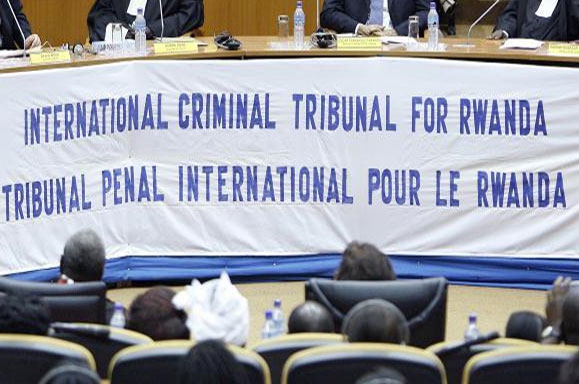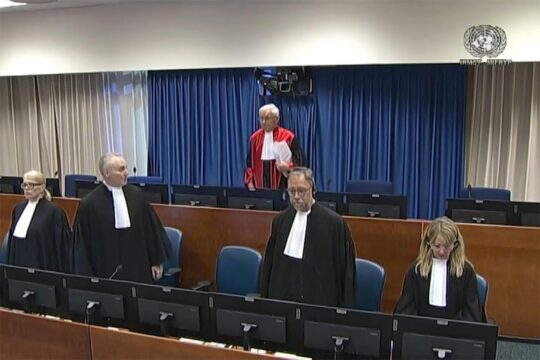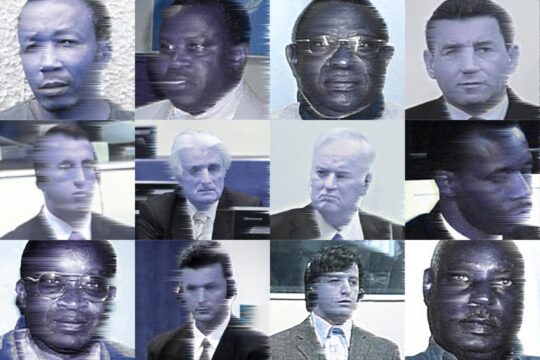After 20 years, the International Criminal Tribunal for Rwanda (ICTR) is officially closing on December 1, although one Appeals decision on the so-called "Butare" case remains outstanding. It is expected on December 14. Below are some of its landmark decisions.
• September 2, 1998: first ICTR judgment
This was the first judgment handed down by the ICTR, but also the first for genocide by an international court. Former mayor of Taba (central Rwanda) Jean-Paul Akayesu was sentenced to life in prison. In the judgment, it was recognized for the first time that rape could be a constituent element of genocide if it was committed with the intent to destroy, in whole or in part, a particular group targeted as such.
• September 4, 1998: sentencing of former Prime Minister Jean Kambanda
After pleading guilty, the head of the interim government in place during the genocide was sentenced to life in jail for genocide, conspiracy to commit genocide, direct and public incitement to commit genocide, complicity in genocide and crimes against humanity. Kambanda withdrew his guilty plea in his appeal, which was rejected on October 19, 2000.
• December 3, 2003: judgment in the Media case
Historian Ferdinand Nahimana, one of the founders of the notorious Radio-Télévision Libre des Mille Collines (RTLM), was sentenced to life imprisonment along with Hassan Ngeze, owner and director of the newspaper Kangura. Lawyer Jean-Bosco Barayagwiza, another RTLM founder, got 35 years in jail. In November 2007 the ICTR Appeals Chamber reduced the sentences, giving Nahimana 30 years, Barayagwiza 32 and Ngeze 35. Nahimana was deemed to hold responsibility for radio programmes inciting genocide that were broadcast on RTLM after April 6, 1994 because he did not punish his subordinates, the journalists of the radio, whereas he knew or had reasons to know that they were committing crimes. Barayagwiza was found not responsible with regard to RTLM, but judges upheld his leadership role within the extremist Hutu CDR party. As for Ngeze, the Appeals Chamber confirmed his conviction for inciting genocide through articles published in his newspaper in 1994.
• June 16, 2006: “judicial notice” of genocide against Tutsis
At the request of the Prosecutor in the trial of three leaders of the MRND (political party of former Rwandan president Juvénal Habyarimana), the ICTR Appeals Chamber concluded that the anti-Tutsi genocide in Rwanda was a “fact of public notoriety” which constitutes part of world history. It unanimously found there was no reason to deny that in 1994 “there were throughout Rwanda widespread or systematic attacks against a civilian population based on Tutsi ethnic identification”.
• May 17, 2011: conviction of the former army boss
Army chief of staff during the genocide General Augustin Bizimungu, who was tried with three other officers, was sentenced to 30 years in jail for genocide, crimes against humanity and war crimes. Bizimungu was convicted mainly for his “superior responsibility” for the murders and rapes committed by soldiers of the regular army, notably in Kigali and Cyangugu. According to a conversation recorded in his case file, an American diplomat warned him on May 13, 1994 that he would one day answer for what happened to Tutsis who had taken refuge in Cyangugu stadium. The judgment was confirmed on appeal.
• June 24, 2011: first woman convicted by an international court
Former Family Affairs Minister Pauline Nyiramasuhuko, the only woman indicted by the ICTR who was tried with five other people, was sentenced to life imprisonment. She is a former social worker, later becoming a lawyer. Nyiramasuhuko was found guilty on seven charges, including genocide, conspiracy to commit genocide and crimes against humanity. She is now awaiting an appeals decision.
• June 28, 2011: first case transferred to Rwanda
After refusing several requests to transfer cases to Rwanda, the ICTR handed down a first decision agreeing to do so. After a long appeals procedure, Pentecostal Pastor Jean Uwinkindi was handed over to the Rwandan authorities on April 20, 2012.
• December 21, 2011: life in jail for leaders of ex-presidential party
Leaders of the party in power at the time of the genocide were found guilty of genocide and crimes against humanity, and sentenced to life imprisonment. Matthieu Ngirumpatse was president of the MRND party of former Rwandan president Juvénal Habyarimana, while Edouard Karemera was its vice-president. In its judgment, which demonstrates superior responsibility more than any other at the ICTR, the two men were convicted for various crimes committed in 1994 throughout the country by members of their party, notably the infamous Interahamwe militia of the MRND. The judgment was confirmed on appeal.







